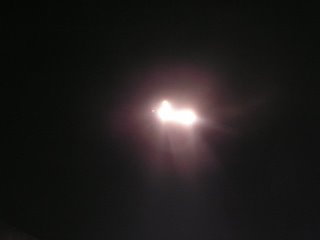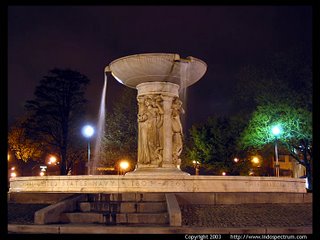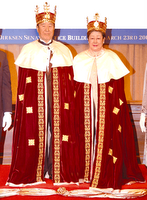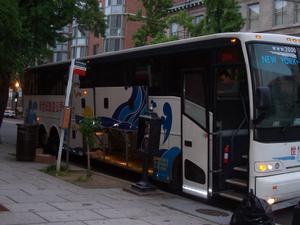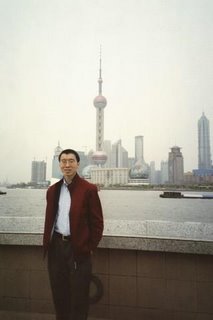 Introduction
IntroductionIn mid April, I had the pleasure to travel to
Shanghai, China for a week to speak to the Shanghai Institute for International Strategic Studies on US-China relations and American Democracy Export. The institute was particularly interested in my work for the
International Republican Institute, which promotes democracy worldwide.
The day before I departed for Shanghai, I met with a state department friend who advised me to cancel the trip. He believed this was a classic case of a foreign government making me an asset or gathering information from me in the guise of an academic trip.
He cautioned me, "they know a LOT about our political party system and we know next to nothing about theirs, so why give away the playbook?" I responded that I would only tell them what can be found through a google search.
However, if I do go, then I should
*Not accept the reimbursement for my travel costs, which is usually in cash.
*I should also not accept the offer of a car or driver/minder to travel with me for sightseeing.
*I should not make any phone calls from my government hotel as it is most likely bugged
He also warned me that every few hours, I may receive phone calls in my room asking me if I want a massage. Some visitors fall for this tactic, which is used to obtain sensitive information. After our talk, I became a bit paranoid. If my hosts had such devious motives, then perhaps I really should cancel. However, after some more thought, I decided to go after all. It was a rare opportunity for cultural exchange.
My official talk would be the Monday after my arrival. After that, I was free and on my own, but being kind Chinese hosts, they wanted to send one of their staff to "take care of me" by accompanying me to the neighboring cities Suzhou and Hangzhou, even though that part is personal sight seeing. They also would book the hotels in those cities, too.
Day 1: Sunday, 4-16-06
Arrival at Pudong Airport
Johnson Hu, the research institute's assistant, waits for me with a piece of paper with my name. He is in a quiet area apart from where the general public has to wait for arrivals. Johnson is dressed in a dark suit and tie. He is 35, but his glasses give him a younger, engineer look. He leads me to the parking garage where a car and driver pick us up.
Johnson is from Hefei, the capital of Anhui Province. He's resided in Shanghai for the last 10 years. He wears a short haircut and speaks fairly fluent, but methodical English. He tells me that he's visited the US for two weeks in 2002: DC, Boston, New York, Las Vegas. (Somehow, most Chinese delegations to the US must include a stopover in sin city.) When he was in DC, he got a view of the US Congress and the White House only from the outside. I told him, "For your next visit, please call me and I'll take you inside the Capitol."
Johnson asks me if I speak Chinese. I respond modestly, "mama huhu," or not very well. We continue our conversation in English.
As we leave the airport for the heart of Shanghai , Johnson explains that the current airport is only 1/3 complete. It will be some time before it is completely built. However, in China "some time" can mean a short time. As we cross the Huangpu river I see cranes dotting the landscape. Johnson delivers me to the
Equatorial Hotel and says he will pick me up in the morning.
Dinner with Tony ChenTony used to be the Asian American outreach liaison at the Republican National Committee (RNC) under the first Bush Administration. When I was doing Asian American outreach for the RNC in 2002, I would always hear the name Tony Chen when I traveled the country to meet key Asian American leaders. I finally met Tony a few years ago when he returned to DC for a short visit. We've stayed in touch ever since. Tony is the one who recommended me as a speaker to the institute. In his mid 40s, Tony speaks with a soft, but clear voice. He's been in Shanghai for the last decade working for a few companies, including Yum Foods, which owns Kentucky Fried Chicken.
Tony came to the Equatorial Hotel after 7pm to see me. The Shanghai Foreign Affairs office runs the four star hotel. In its day, it used to be the best Shanghai had to offer Foreigners, but it is now eclipsed by the Hilton Hotel behind it. For a government hotel, the Equatorial feels like a five star facility. One night's stay runs about 800RMB or about $100.
We walk on the people bridge, past the park and toward the mall. Tony's advice to me when I'm walking on the people bridge: avoid the street vendors from Xin Jiang province (next to Tibet). They're usually Hui Minorities and are "very aggressive." A few Chinese men push business cards toward any foreigners who walk by, usually to sell airplane tickets or watches.
The first place we go to has shut down. And the second place is not open until two days later. So, we go to the closest Shanghai restaurant on the block. At dinner, Tony gives me a quick lesson on Chinese lecture etiquette. During my talk, I should not be surprised if a cell phone or two goes off and they speak in the room. Or, if participants fall asleep during my talk. Apparently, this is quite common in Chinese symposiums. Tony alerted me that the institute had one objection to one slide in my PowerPoint presentation: a cartoon depicting President Hu Jintao as an angry dragon when meeting with President Bush. I agreed to remove it for the good of US-China relations.
When Tony first arrived in shanghai many years ago, he had a horrific experience at a Karaoke club. The manager tried to bully him to pay 10,000RMB (about $1250) for a few drinks. He closed the door and had couple of his goons show up to scare Tony. Fortunately, for Tony, he was a smooth talker. He pulled out his US passport and told the manager that he was a US Government Official. "If you don't let me out right now, then this place will be closed down tomorrow!" They released him immediately.
Despite the warnings about safety, Tony reassures me that Shanghai has a great reputation as a fairly safe city. With that, we take a taxi back to the hotel and I prepare for the big day.
Day 2: Monday, 4-17-06
The Lecture
Johnson takes me to the nearby research institute to meet director Xia Liping, an amiable gentleman with a big smile. He is from Fuzhou, Fujian province, right across Taiwan. He is perhaps in his 50s, but like most Chinese, looks 10 years younger than his actual age. Must be the tea and tofu. He has taught at the Defense University in Beijing and travels to the US quite often, at least once a year.
Mr. Xia greets me warmly, "A real pleasure to meet you!"
I respond, "You honor me by inviting me."
He asks me about my background. I explain briefly how my family moved in 1982 from Hunan Province in the People's Republic of China to the People's Republic of Berkeley, California.
Mr. Xia reveals that he lived in the US for one year and conducted research with the Atlantic Office. He presented me with a little bag with some academic journals; one journal was in Chinese.
Mr. Xia asks what I expect from President Hu's visit to Washington, DC later in the week. I explain that it would be about 20% substance and 80% fluff. He quizzed me on American views of China: "Is the US-China relationship competitive or cooperative?" I explained that it is both. The relationship is dynamic and very fluid. It shifts depending on the crisis at hand.
After an hour of pleasantries and chit-chat, I return to the hotel for lunch and prepare for my 2 pm talk.
About 18 academics show up for my talk. They are mostly middle-aged, but a few are in their 30s. To give you an idea of what I spoke about, I include only the beginning part of my speech:
Speech IntroductionThank you to Mr. Tony Chen for inviting me. And thank you to Mr. Xia Li Ping for hosting me. And thank you to Mr. Johnson Hu for picking me up at the airport. I know that it is not an easy job. I used to do the same job when I was at DiCon Fiberoptics, my first office in Berkeley, picking up French interns at SFO.
I am very honored to be able to talk to you today. There is an English proverb, "experts come from out of town." So, perhaps that is why you think I know something about the topics of which I am about to discuss today.
President Hu Jintao is on his way to the US, starting in Seattle on 4/18 and arriving in DC 4/20 to see his old friend President Bush. So, it is appropriate that we are discussing US-China relations.
When Wen Jia Bao visited 12/2003, I had the pleasure to see him at the White House. While I cannot be present this time to welcome President Hu Jintao in DC, you and I can wish him and President Bush well in their visit.
The last time I visited Shanghai was 1/99 when I came for a week with friends. It was during winter break right before Spring Festival and I stayed at a youth hostel on the Wai Tan (Bund). I shared my room with 7 people: 3 Japanese students and 2 Europeans and my teaching friends. One bathroom. Now, I have my own room at the Shanghai Equatorial Hotel and Mr. Johnson to show me the city. What a difference!
Like old friends, the US and China have many shared interests and a shared future. And like married couples, they also have disagreements and the occasional fights, but we realize that a divorce is not possible, for now. I can say this because I am the product of both countries, both cultures, both peoples.
I was born in Hunan Province, famous for spice and being the home of modern China's most prominent native son--revolutionary leader and Chairman Mao Zhu Xi. Hunan also gave us Mr. Lei Feng (a young soldier who died in the 1960s, but has since been lionized by the Communist Party as the ideal socialist martyr), a very popular comrade and I've been told, may be related to me.
I was raised in Berkeley, CA--birth of the Free Speech Movement and home to more socialists than all of China now. The City is named after the Irishman George Berkeley, who is also considered by some to be the first great American philosopher.
I taught English in Huadu (or flower capital), home of Mr. Hong Xiu Quan, the revolutionary leader of the Taiping Rebellion that challenged the Qing Dynasty in the late 1800s.
I have lived and worked for more than four years in Washington, DC ¨C named after our first President and leader of the American colonies fighting to expel the British Crown during the Revolutionary War.
And now, I've come to Shanghai, the birthplace of the Chinese Communist Party in 1921 and now leading China's economic engine to a brighter future. And home to author Lu Xun, my favorite modern Chinese writer. As you can see, I have a very strong attraction to revolution!
However, today's talk is not about me; rather, this talk is about living in revolutionary times and momentous changes. Recent historians in the West have called the 19th century the European Century, the 20th century the American Century and the 21st century the Asian Century. Let me modify this characterization by saying it will be the CHINESE century and
Shanghai is at the heart of that century.
* * *
They nod politely.
An old timer in the back falls asleep about 5 minutes after I begin. Johnson's cell phone rings, but he is polite enough to step outside the room to talk.
The talk concludes about 3:30pm. I answer three questions.
Evening dinnerMr. Xia and Johnson take me to a restaurant serving Shanghai Cuisine.
Mr. Xia has visited North Korea's Kim Kong region, known for its hot springs. He relates to me his experience of interacting with the North Korean people.
I ask Mr. Xia about corruption in the Chinese government, "How do you control it?"
"We're tried morality, but that is not working well," He stated.
Moving on to lighter subjects, Mr. Xia asks me the typical Chinese question, "do you have a girlfriend?"
"No." I respond.
After a few moments, I ask Mr. Xia the same question. "Do you have a girlfriend?" He laughs, but does not give me an answer.
"Are you marrying Chinese?" He probes further.
"I am an equal opportunity dater. If there is a beautiful woman, Chinese or Western, then I will consider her," I explain.
Day 3: Tuesday, 4-18-06
A stroll on Nanjing Road
I am in Shanghai, the new financial capital of China. Life flows all around me; it wells up from the subway exits, a constant wave, descending from stairs. I see it everywhere: Traffic. Babies. Food. Gucci Ads. Vendors. Traffic. Beggars. Life. Life coming upon me. Each face looks exactly like mine. No one looks at me.
I pass a mother and child sitting on the sidewalk. The little one is maybe two years old. Mom wears a red cap and holds out a paper cup, but her swollen red cheeks face the sidewalk. She has that look. The look of desperation. Pedestrians pass her by. I watch her for a few minutes from the corner. This morning, I gave my dinner leftovers to the old beggar by my hotel. I wished I had some more to give to mom.
An old traveler I met in Beijing once told me that the best part of visiting a city is to peek into the alleyways and see what people are really up to. Following his advice, I enter an alleyway off of the main road. A cobbler has set up shop at the entrance out in the open. He has a shoe stand and some old shoes to the side. A young lady stops by. Inside the alleyway are mundane items you can find in alleyways anywhere in the world: laundry hanging on rope lines. Three old men in shorts and T-shirt playing a game of chess on a table that's too low for them. A bulletin board warns, "maintain fire safety: regular meeting this Friday." An art shop displays Western paintings, oil on canvas.
Pearl Orient towerStanding at 468 meters tall, the Pearl Orient TV Tower is the highest tower in Asia, but the third highest in the world.
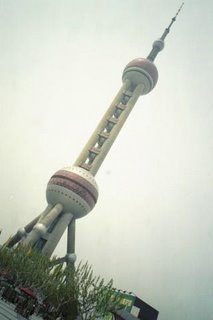
It shoots straight up like a rocket, but most observers have compared it to a futuristic space ship from a science fiction movie. To get in, I paid the basic price of 70RMB (about $9), which allowed me to go the middle ball and to have a panoramic view of the city.
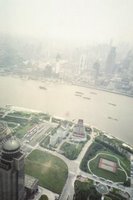
On the windows of the observation deck are etched purple lettering in both Chinese and English:
West: Guangdong, Guangzhou 1260KM
South: Taiwan, Taibei 680KM
East: Dozens of ships and barges dot the Huang pu river, racing toward the ocean. Those ships enter the Huang pu like they're on a never-ending conveyor belt. I see a construction site below and catch the light from a welder's torch.
North: Liaoning Province, Shenyang 1033 KM
Plastic flowers line the deck, evenly spaced every 5 feet or so. Tourists have a camera or camcorder attached to their hands. Each group bears a different accent.
Day 4: Wednesday, 4-19-06
Train ride from Shanghai to HangzhouMr. Yang, the institute driver takes me to the North train station, where I wait along with thousands of other travelers. He is a native of Hebei Province, Central China. In his late 30s, Mr. Yang earns about 3000RMB a month (about $400). "Can you support a family with that?" I inquire. He says that 2000RMB a month is sufficient to support a family, even in Shanghai . He wishes me a good trip and we will meet up in Suzhou on Friday.
A female voice announces the bad news: our train is delayed by 30 minutes. The family of three in front of me is upset: "It can't be! It can't be late." When I ask the woman if she's going to Hangzhou for business or pleasure, she replies that she has some "affairs over there." Chinese are rarely polite or detailed with strangers.
Once the gates open, the crush of people rush through like lemmings.
At the train door, passengers elbow their way pass the conductor and onto the train. The conductor admonishes them: "No pushing. Everyone will be able to board."
We are traveling about 20 miles an hour. The train passes by fields of green (rice fields), brown (warehouses) and white (tiled farm houses which have replaced mud huts). I am sitting in the middle seat of the hard seat section of the train. I see three passengers around me talking on their cell phones. Two people who have no seats are standing in the aisles. The music shifts from a pop song to one without lyrics¡ªa plaintive piano song. A young vendor with an untucked, white shirt patrols the aisles peddling bottled water inside a basket.
The man across from me is perhaps in his early 30s. He wears jeans and is reading a Chinese newspaper. The man on my right is also buried in his newspaper. The young lady to my left, by the window is busy writing numbers on her papers. She must be in her mid 20s and peers intently through her spectacles at her documents, which are covered with clothing design samples: bits of burberry and plaid patterns fill the pages. She has curly, brown hair and glances outside the window occasionally.
Cigarette smoke fills the cabin and the music now switches to Beijing Opera. The TV screen hangs from the ceiling. Knees knock together. The cabin fills with the sound of seeds hitting the floor. Chew chew chew. Crackle. Cough. Cough.
One rider across the aisle discovers he's on the wrong train. He has a ticket for train 739, but we're on train 743. His destination is Nanjing, north of Shanghai. We're heading south. His seatmates laugh at him. He complains to the conductor that "those train clerks told me to get on this train!"
A young man across from me strikes up a conversation. He is darker than the other Chinese and wears black-rimmed glasses. He has spiky black hair. A fourth year Chemistry student at the University, he is returning to Wuhan, the capital of Hubei Province. He worked in a factory job for two months, but did not like it. "I want a job in sales after graduation," he tells me with a smile.
I tell him that I studied history at the University. He laughs. He's incredulous that people still study such a subject.
"And what do you do with a history major?" he inquires.
"I taught school for a year." I explained.
"Sounds right. That's what they usually do," he added.
More sounds of seeds hitting the floor. Chew chew. Crackle Crackle. Cough. Cough.
Conductor announces: "We'll arrive in about an hour." We now are traveling about 40 miles an hour and pass by more rice fields and some greenhouses in white tents.
Fashion designer girl barks into her cell phone: "I need 5050 model type. I'm on the train now."
Another vendor makes a special presentation to sell cotton socks. He passes the samples around.
We finally arrive in Hangzhou's East Station a little after 1:30pm. Outside the station, I see the Chemistry student again. He introduces himself as Mr. Lu. Before we part ways, he wishes me a safe journey: "Yi lu pin an." I head for the taxi stand.
Lily Shentu: A friend of a friend of a friend Lily is the student of Timilin, the girlfriend (and now fiancee) of John Koehn, my friend and Oregon Victory campaign colleague. Before I headed out on my trip, I asked Timilin if she could offer me any insights on the Shanghai area.

She kindly provided me the name of her former Ningbo University student Lily, who would be able to show me around Hangzhou. Lily and I spoke by phone when I was still in Shanghai. She was generous enough to reserve a room for me at a local youth hostel. She wanted to meet me at the train station, but also had a job interview that day. She did not yet have a time for the interview, so tried to have a friend of hers meet me. I told her that it was unnecessary and too much trouble to meet me at the train station. It would be much easier to simply meet me at the youth hostel.
After a long taxi ride (50RMB), I finally arrive at Jiang Nan Yi Youth Hostel. As I am checking in at the counter, a young lady in denim shorts and a silk black top from behind greets me. "Hi Andy!" It is Lily. Her face radiates a big smile.
She explains that her interview finished early, so she decided to meet me at the train station after all. She had written my name with a neon green marker on a 8.5 x 11 piece of paper and stood at the train station exit, hoping to meet me. We probably missed each other by a few minutes and a few feet.
I give Lily the package that Timilin had entrusted to me to deliver to her student: some jelly belly beans and some other knick-knacks. After I place my bags in my room, we sit down on the deck for a few minutes. Lily takes out a bright, gold pen to write on her notebook. "Wow. That's the brightest gold pen I've ever seen." I exclaim.
"My father gave it to me." She explains.
"It looks like an executive pen." I remark.
Lily handed the pen to me: "Then, it's yours."
"No, I can not take it from you." I protest.
She insisted. I refused a couple more times before I accept.
"I better be careful about what I say I like about you." I joked.
Lily accompanies me on a leisure walk by West Lake on the South Line, a newly-built path that is dotted with Willow trees and offers a breath-taking view of the lake. President Nixon visited this city and even took a boat ride on the lake in February 1972, when it was still in the middle of winter.
After our walk, Lily and I board the bus to go to her home, where she changes into something warmer. When she came out, She handed me a tea gift bag. We return to the youth hostel for dinner.
Lily is starting a new job as a translator for the
Hangzhou World Expo Leisure Fair that will run for the next 6 months. It is an excellent opportunity for her to practice her English skills. Since she graduated last year, she has not had too many chances to speak English.
After dinner, Lily takes me on a leisure walk by West Lake.
Day 5: Thursday, 4-20-06
Exploring Hangzhou
Lily and I meet in the morning in downtown. She takes me to the fairgrounds where the World Expo will take place. We pass various vendors and kiosks. I have not yet had breakfast, so I stop by a dumpling stand where I pick up a few jiaozi and quickly wolf them down. Lily watches me, but has already had her breakfast.
Lily then takes me to the Hu Pao Yuan or the Running Tiger Garden. It reminds me of that scene in Crouching Tiger, Hidden Dragon when the characters played by Michelle Yeoh and Chow Yun Fat are resting in a simple open structure in the bamboo forest. It is the essence of serenity. A light breeze blows. A little brook babbles its way past the footpath. The air is fresh and I feel like I am the first person to step here in a hundred years.
About 1:00pm, Lily has to leave for her office, but she suggests we meet up again tonight about 9 or 10pm. She suggests a few places that I can visit for the afternoon. However, I miss my bus stop and wind up in the wrong part of the city. A few more wrong buses and I wind up at Zhejiang University campus. After an hour or so of riding wrong buses, I finally get to the Su Ti garden. In mid afternoon, I return to the Youth Hostel to take a nap.
When I wake up, it's already past 8pm. I go downstairs for dinner and then call Lily again. She asks that I meet her about 10pm at the Italian Restaurant on the South Line.
Just at this time, President Hu Jintao's state visit to the United States is broadcast on Chinese TV. CCTV, the state-controlled TV News Station shows Hu as a great hero, being well-received by the American president. The chatter among Chinese is that President Bush's approval ratings went up in China after the visit. Perhaps, he is more popular in China than the US? As you can see, the Chinese greatly value China-US Relations, much more so than most Americans, I believe.
Day 6: Friday 4/21/06
Touch the people: Hangzhou to Suzhou
Lily and I meet for a final breakfast at a "da pai dang" or little eatery. She orders a special chicken soup for me that was quite sweet. We both have a sizable plate of hand-made noodles or "la-mian." After breakfast, she boards the bus to go to work and I hop into a cab headed for the train station. I tell Lily that I will miss her company when I'm gone.
When I arrive at the station, the ticket seller, in a Greyhound bus driver tone-of-voice, announces that the next train is 12:45pm, arriving in Suzhou about 3pm. Not wanting to wait so long, I knew I had to get a bus. However, to save a few dollars, I go to the public bus stop nearby. Just as I approach the No. 512 bus stop, it pulls out with a full load. So, I wait along with farmers with big plastic bags and split bamboo poles, young men with unkempt hair, ruffians with shifty eyes. Whenever I travel, I usually want to "touch the people" and to see how the common man travels. Well, now that I am among the people again, I realize that they frighten me.
The bus finally pulls up and I board. Luckily, I get a window seat. On the third stop, I get off and buy a ticket at the bus station. The clerk tells me that I better hurry as my bus is pulling out in a few minutes. A short, middle-aged lady asks me to follow her as we race through some tight alley-ways, littered with water and trash. After a few minutes, we arrive at a small van. I get in. I'm relieved that we are now on our way to Suzhou at last. We pull out of the station and drive a few blocks before we pull into another neighborhood with small streets. The driver tells us to get out and transfer onto a bigger bus. Once onboard, we get onto the highway.
An hour into the drive, we stop at a toll booth. Then, we pull to the side of the road for a few minutes for "inspection." A man comes to the side of the bus and asks the driver to open the doors so he can examine the luggage to see that no explosives or dangerous items are onboard. A few minutes pass. We're back on the road. One more hour passes. We should be very close to Suzhou by now. The driver pulls the bus to the side of the road and yells out: "Those of you going to Suzhou¡ªwe're here! Get out now."
A few passengers ask the driver, "Wait a minute! Aren't we going to the main bus terminal in town? This is still the highway outside the city!"
The driver responds, "We're not going to the bus station. Besides, we're right outside the city and the public bus stop is right here. Get on the public bus, which will take you inside the city. Get off now!"
About 10 farmers get off, many of them visibly upset and cursing, "Ta ma de," which translates roughly into "motherfucker." I get off with the farmers. The bus pulls away. For a few moments, everyone looks dazed. We now realize that we've been riding a bus without a permit. Some farmers cross the highway. A few look at a map to figure out exactly where they are. I go to the nearby convenience store to ask for directions. Sure enough, we are right outside Suzhou. I decided to wait for the public bus along with the rest of the group. Fortunately, the public bus comes on a frequent basis. We take the bus into town. I hail a cab, which takes me to the Gloria Hotel, which costs 1000RMB for the night.
I don't yet see Johnson or the driver anywhere, but my room has been paid for already. After resting a bit and sending some emails, I decide to go walking about town. I visit the Humble Administrator's Garden, built in the Ming Dynasty by a retired scholar-official.
I contemplate my visit to these two cities: how wonderful travel is¡ªthe way it shakes you from your normal everyday routine and allows you to examine your life from another perspective. The Chinese have a famous proverb, "Up above there's paradise, down below there's Suzhou and Hangzhou." Now that I've visited both cities, I truly understand this saying.
Day 7: Saturday, 4/22/06
Return to ShanghaiJohnson and the driver Mr. Yang drive me back to Shanghai. Johnson has to take off for Beijing for a business trip, so he cannot accompany me to the airport on Sunday. Instead, Mr. Yang will take me.
Over lunch at a scrumptious
dim sum restaurant, I meet up with Junko Toyoda, my Japanese friend who left DC three years ago.
Lu Xun Park
After lunch, I head off to the Shanghai Hong Qiao sports stadium metro stop to meet David Zhang, the friend of my Seattle friend Rich Tao. They met when Rich was studying Chinese in Beijing for the year. David agreed to meet me for dinner. A fresh graduate of Qing Hua University, or the Harvard of China, David works as an engineer for an American company testing instruments. His English is good and fluent.
David shows me the Lu Xun park, named after China's most famous modern writer from the 20 th Century. Lu Xun's body rests in the park.
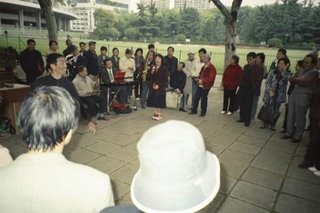
We approach a large chorus group of maybe 100 senior citizens. They sing a hearty song with a conductor leading them in the front. Next to the chorus is another smaller group of senior citizens, perhaps a dozen strong. They play the "er hu" --the Chinese string instrument with two strings, tambourines and a make-shift drum that's really a large oil canister. One elderly gentleman in his 70s skips about as his cohort is singing a popular folk song, "qian fu de ai," the song I learned while singing Karaoke during my year in China teaching English. All the students used to tell me that it was an old person's song.
A beggar woman comes to me. I quickly dig into my pocket and hand over a few bills. David remarks, "You are generous!"
I respond, "She needs it more than me."
After a quick visit to the grave of the literary master Lu Xun, we walk back toward the singing senior citizens.
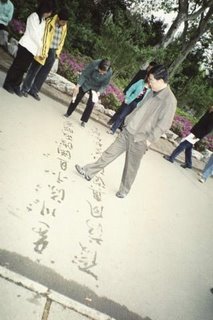
On the way, we pass by an elderly woman writing poetry on the ground with a large brush dipped in water. A few people stop to stare, but most pass her by. She is fairly non-responsive when I try to get David to ask her the meaning of her poetry.
Outside the park, we see a large group of teenagers waiting eagerly for the evening concert featuring "Zizi" a famous pop star from Singapore. They pose for a group picture. They could be teenagers from Los Angeles or New York City with their dyed hair and tight jeans and sneakers.
Antique shop and Dinner with DavidDavid takes me to a nearby street that's been restored to look like Colonial Shanghai. I spot an antique shop. The shopkeeper, a bespectacled lady in her 50s invites us inside. She is gregarious. She tries to interest me in various items: an Abacus from pre-1949 era or the Qing Dynasty. She's not sure. A wine jar with a spout. Qing Dynasty. After a few minutes, three tiny tea pots come to my attention. The first has three monks carrying water. The second has a double spout. And the third is decorated with lotus flowers and a poem from antiquity.
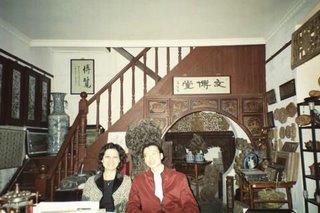
I tell her that I'm interested in buying the tea pots. She sits us down at the Qing Dynasty table and serves us green tea -- Gao Shan (high mountain) tea from Taiwan. We chat for the next 90 minutes.
17.84 Yuan. That's the monthly wage that she used to make at a medicine factory during the Great Proletarian Cultural Revolution (1966-76). "I should've been sent to the countryside, but I didn't change my hukou," the proprietor explains. The hukou is the Chinese identity papers that at one point allowed Chinese to work and move about from city to city. It is a combination driver's license, social security number and ID. While the hukou still exists, it is slowly loosening its grip on the Chinese people. "A bowl of rice or noodles cost only 10 jiao," she continued. A jiao is one tenth of one yuan, which is about 12 cents.
Her husband teaches Japanese language classes on the weekends and also studies a bit of English. Her son is 23 and wants to go to the US to study. She serves us tea in mini cups and says her father-in-law was a Capitalist and Landlord. A shopkeeper, he was arrested and persecuted during the Cultural Revolution. Her husband collected many artifacts from the Qing Dynasty and now they're selling them off. Mrs. Zhang has had the shop for about 8 years and rents out space to other tenants, too.
By 8pm, David's stomach is growling. He is not shy about letting the shopkeeper know that we have to get going. She takes out the calculator. After a few minutes of punching in various numbers, we come to an amicable agreement.
Before I go, she offers me a complimentary postcard that she normally sells for 5 Yuan (or about 50 cents). She offers me a second postcard. Both feature cigarette ads from the 1930s era with beautiful Chinese maidens in splendid "qi paos" or traditional evening dresses.
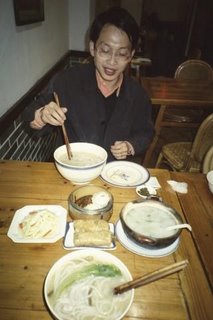
We walk another block or so to a food court. David treats me to a generous dinner of Yunnan Province Across-the-bridge noodles, tofu, congee, pickled vegetables and steamed buns. We talk mostly politics and life in general for the next two hours. When we leave about 10pm, the metro station is closed. The streets are flooded with the teenagers we saw earlier in the night. Apparently, the concert has let out and everyone is rushing for the closest taxicab. David and I walk about 10 blocks before I can get a cab back to the hotel.
Sunday, 4/23/06
Farewell to ShanghaiSo, this is the end. My travels are over. Today I'll get on a plane and be back at home in Washington, DC. It was one week, but it felt like a month. I am glad to be back home, but also sad to leave Shanghai, the center of the 21st century. I hope my exile will not be for long.
* * *
See my
photos
